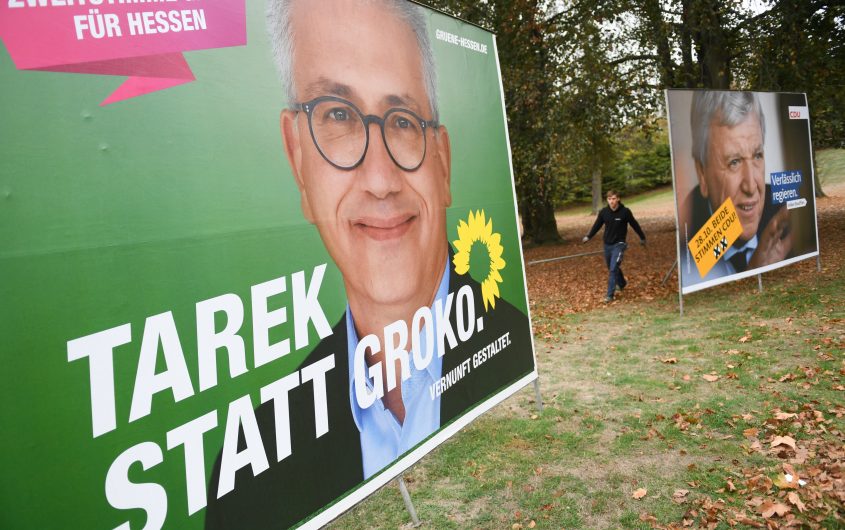
Arne Dedert/picture alliance via Getty Images
Local Election in Hesse has National Impact

Susanne Thelen
Institute of Political Science at the University of Technology Chemnitz
Susanne Thelen was a DAAD/AICGS Research Fellow from October to December 2018. She is currently a doctoral candidate at the Institute of Political Science at the University of Technology Chemnitz. Her PhD is about campaign strategies, especially “negative campaigning” in the 2017 German federal election.
Before beginning her PhD, Ms. Thelen interned at the Konrad Adenauer Foundation in Washington, DC, during the 2016 presidential election. Her Master’s thesis analyzed the Twitter attacks by presidential candidates Donald Trump and Hillary Clinton. In 2017, she worked for the CDU Department of Campaigning & Advertisement during the German federal election to continue her research about election campaigns.
Ms. Thelen lives in Rhineland-Palatinate and is a member of the CDU and a member of the State Executive Board of the CDU in Rhineland-Palatinate. She worked as a Retail Business Management Assistant, studied Business Administration and Marketing (BA), and holds a Master’s in Politics and Communications from the University of Trier.
During her time at AICGS, Ms. Thelen will focus on the differences between German and American campaign strategies. She will examine U.S. campaign strategies and American influence on German campaign strategies, including the ways in which they may serve as role models to some German parties. Moreover, the midterm elections in November 2018 may provide new perspectives on “negative campaigning” or other campaign strategies. Negativity in election campaigns is a part of political culture. While in Washington, Ms. Thelen will discuss this issue with other researchers, professors, and political experts, among others, investigating whether there are similarities or discrepancies between electoral campaigns in Germany and the U.S.
The state election in Hesse was a disaster for Germany’s two Volksparteien, the CDU and the SPD. Although the CDU remains the strongest party with 28 percent, this election marks the worst result since 1966 and a loss of 11 points compared to the 2013 election. The SPD received 19.8 percent, a loss of 10.9 points. As a result, the Social Democrats must share second place with the Greens. The Green Party, led by candidate Tarek Al-Wazir, Hessian Minister of Economics, Energy, Transport, and Regional Development and Deputy of the Hessian Minister-President, gained 19.8 percent—even more than the Greens gained two weeks ago in the Bavarian election. Overall, there is a positive trend for the Greens and their key issues, making them the winner of this election.
The most recent polls before the Hessian election already showed that the CDU would have some difficulties continuing its coalition with the Greens. After the Bavarian election in mid-October, Hessian polls showed the CDU at around 26 percent, the Greens at 22 percent, the SPD at 20 percent, the right-wing Alternative for Germany (AfD) at 12 percent, and the Liberals (FDP) and the Left at 8 percent. In the end, it was not nearly as bad for the CDU and SPD as predicted.
Which Coalition Will Rule the State Now?
Minister-President Volker Bouffier (CDU) can continue the coalition with the Greens, although they have a majority by just one seat. Keeping in mind that other options are possible as well, he announced Monday morning at a press conference that he will talk to the Greens, the Social Democrats, and the Liberals, who gained 7.5 percent (2.5 points more than in 2013 but not even close to the 16.2 percent they had in 2009). However, he refused to negotiate with the Left (6.3 percent) or the AfD (13.1 percent).
Speaking of the AfD, with an increase of 9 points compared with 2013, the right-wing party is now represented in the Hessian parliament for the first time, and represented in each of the sixteen state parliaments in Germany.
A grand coalition with the CDU and the SPD is a mathematical possibility with 69 seats in total and a majority of one seat; a “Jamaica” alliance formed by the CDU, Liberals, and Greens, who hold a majority by 11 seats, is also possible. A “traffic light” coalition, named after the party colors of the SPD, the Liberals, and Greens is also an option, but would have a majority by one seat. This, however, is unlikely because the FDP has already declared that it will not support an SPD-Green alliance. In the last-mentioned possibility, the Greens could occupy the position of minister-president because they beat the SPD by 94 votes of almost 3 million voters in total.
What Explains the Results?
The elections in Hesse and Bavaria this month have been the first elections since the new grand coalition government (CDU/CSU-SPD) was formed earlier this year. The voters in these two states used the opportunity to express their feelings about this alliance. The recent decisions by the government in Berlin—such as the ban on vehicles running on diesel in cities like Frankfurt—had a huge impact on the results. Voters were also angry about the disagreements within the Grand Coalition in Berlin, e.g., the discussions about promoting Hans-Georg Maaßen to the role of deputy minister. With that in mind, the Hessian voters wanted to teach the politicians in Berlin a lesson.
This time, Hessian voters weren’t just deciding on regional issues like education, jobs, or the economy, (although issues are always on the ballot). Hesse is divided: on the one hand, there are cities like Wiesbaden and Frankfurt, the country’s banking and finance capital, home to the European Central Bank since its establishment twenty years ago, and on the other hand, small towns shape the landscape. For the inhabitants of “Mainhatten,” a description of Frankfurt based on its New York City-like skyline, affordable housing is a pressing topic, whereas small towns and villages with fewer cultural highlights and worse infrastructure struggle to attract new inhabitants.
A Regional Election with National Importance
How will the election in Hesse influence the discussion about personnel affairs in the national government? Despite the worst election results for the SPD in history, chairwoman Andrea Nahles already declared that there will not be any change on the national level. Hesse’s top SPD candidate Thorsten Schäfer-Gümbel, who competed in the state for the third time, did not comment on his career after this loss.
In the last few weeks, the role of Chancellor Merkel has been part of the discussion. Will she retire if her close friend and CDU vice chairman Bouffier loses in Hesse? Will she run again for the chair of the CDU in December? After these disappointing results on Sunday, she said in a press conference on Monday that she wants to open the door for a new CDU chairman or chairwoman. Moreover, Merkel declared that she will remain as chancellor, but she will not be available as the CDU’s top candidate in the 2021 federal election. Although Merkel made her decision to step down during this summer, her reasons for announcing it now are related to the big loss by the CDU in Hesse.
All in all, the question of who will become “the next Merkel” now dominates the German news. Some well-known party members have already declared their ambitions, but it is almost six weeks until December 6, when the new chairman or chairwoman will be elected at the CDU party congress.
The results in Hesse show that the CDU, as well as the SPD, tried to reach the voters on the right and the left side. Neither the CDU with education issues nor the SPD with affordable housing convinced the Hessian voters, and with that, the “people’s parties” were not successful. Instead, the Greens focused on the center of the political spectrum and reached more people than ever before. With a strong junior partner, Bouffier and the CDU can continue the black-green government, but with a one-seat majority, it will be more difficult to enforce conservative issues.








